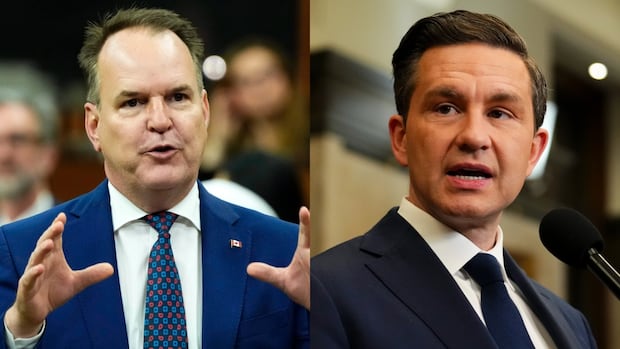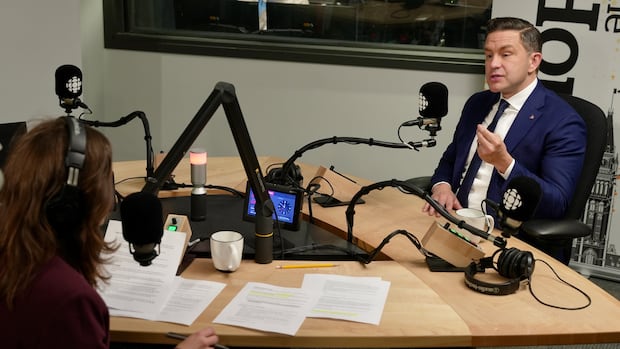Government House Leader Steven MacKinnon and Conservative Leader Pierre Poilievre are laying out their parties’ priorities ahead of Parliament’s return on Monday for its fall session.
In an interview on Rosemary Barton Live that aired Sunday morning, MacKinnon said the federal government under Prime Minister Mark Carney will be presenting a budget in October that will “chart an economic path for the country.”
He said there’s “no question” Ottawa needs to act on a number of fronts, including addressing the Canada-U.S. trade war that is damaging the Canadian economy and eliminating the GST on new homes.
All of those investments and more are going to be expensive but necessary, MacKinnon said.
“The deficit will be substantial. Let’s not sugarcoat it. We have made these major investments this year. They are new, and that means we’re going to have to take a hard look at spending. So a substantial deficit means hard choices.”
The last economic update that Canadians got from the federal government was in December 2024, before U.S. President Donald Trump took office and hammered Canada with tariffs on a wide range of goods.
That update, overshadowed by chaos when then-finance minister Chrystia Freeland abruptly resigned, showed the federal deficit ballooned to nearly $62 billion. The Liberals said the spike was mostly due to one-time costs.
- Cross Country Checkup is asking: Federal MPs return to Parliament on Monday. What do they need to fix first? Leave your comment here and we may read it or call you back for our show this afternoon
MacKinnon would not say when exactly the federal government would announce its fall budget, and he left that matter to Finance Minister François-Philippe Champagne.
In terms of difficult choices, MacKinnon said Canadians “expect their governments to look through the range of government services and programs from time to time” and “make sure that we’re delivering maximum impact for taxpayers’ dollars.”
“We’re certainly not going into it with any fixed objective, in terms of headcount or in terms of programs, but we’re looking at what makes sense, what constitutes an investment in Canada’s future of support for vulnerable Canadians.”
Cracking down on crime
MacKinnon told host Rosemary Barton that the Liberals will be presenting bills to tackle crime in Canada, particularly on bail reform and creating safe spaces around places of worship.
“We wanted to remove any doubt that when you see violent offenders getting reinserted into the community,” MacKinnon said. “That’s something that needs to be addressed.”
Asked whether the legislation would include mandatory minimum sentencing, MacKinnon said he doesn’t want to go “too deep into the legislation” at this time, “but what you can expect is that the government will act, I think, very decisively.”
This week, CBC News reported that the government is expected to introduce legislation as early as Tuesday cracking down on people who wilfully intimidate and obstruct individuals entering places of worship, cultural community centres and schools.
Justice Minister Sean Fraser said the federal government is not responsible for ‘regulating the ability of people to be in a particular place,’ but is seeking to add criminal provisions prohibiting the obstruction of facilities such as synagogues and mosques.
A source with knowledge of the government’s plans said Ottawa will propose three new offences under Canada’s Criminal Code, including creating a new hate crime offence.
The government is also expected to propose a new intimidation offence that would make it illegal to try to scare people so they won’t access religious or cultural buildings used by identifiable groups.
Poilievre outlines Conservative priorities
On Sunday morning, Conservative Leader Pierre Poilievre addressed his caucus in Ottawa and said that over the summer, the party “led the debate on job security, inflation, home building, natural resources, crime, drugs and so many other issues. And we’re still getting started.”
Poilievre said the Conservatives supported the Liberal government in the spring sitting on certain pieces of legislation, such as the One Canadian Economy Act, because “we wanted to be a helpful part of the solution.”
“We want for the country to succeed. And that’s why we need to take a very careful look at Mr. Carney’s many promises and compare them to the results. Do the words match the deeds?”
Poilievre lambasted the prime minister and argued he’s failing to address affordability issues and stifling economic growth by not moving fast enough on major resource projects.
Conservative Leader Pierre Poilievre, speaking with CBC’s Catherine Cullen on Friday morning, says building more liquefaction plants to process Canadian natural gas and increasing international buyers, specifically in Asia, could help reduce global emissions.
“Unemployment is worse, the cost of living is worse, home building is worse, divisions are worse, the tariffs are worse, crime is worse, immigration is worse. That is not what Canadians voted for,” he said.
“What we are getting from Mark Carney is the same Liberal bait-and-switch: Say one thing and do the opposite,” the Conservative leader said.
Poilievre said the Conservatives will propose solutions to the issues they’ve identified, including pushing municipalities to speed up building permits, capping immigration and passing the Canadian Sovereignty Act.
The proposed legislation repackages many of the party’s campaign promises, including scrapping the West Coast oil-tanker ban, killing the industrial emissions cap and eliminating the industrial carbon tax.
On Thursday, Carney announced the initial tranche of projects the federal government says it will help get off the ground quickly, including expanding liquefied natural gas production in British Columbia, upgrading the Port of Montreal and building a copper mine in Saskatchewan.
Poilievre panned the announcement and told his caucus “it’s been six months. [Carney] has not granted a permit for a single new nation-building project.”









